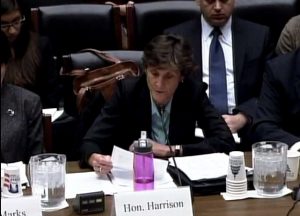By Davis Wax
Editorial assistant, Spring/Summer 2013
Update: In about 48 hours, with almost no chance for public input, the North Carolina state Senate passed a poorly designed bill to fire all current members from several N.C. advisory boards and commissions, including the Utilities Commission and Environmental Management Commission. Give your state Rep. a call today and ask that they oppose this legislative overstep and actually govern. [https://www.ncleg.net/representation/WhoRepresentsMe.aspx]
An unprecedented power grab is in the works in North Carolina, where Republican majority leaders are looking to cut and replace environmental and other key decision-makers on the party’s own terms.

State Sen. Bill Rabon introduced SB 10 aimed at removing environmental experts from state committees. Photo credit to ncleg.net.
The N.C. Senate Rules Committee met on Feb. 5 concerning Senate Bill 10, the “Government Reorganization and Efficiency Act,” legislation that seeks to remove 131 members of eight influential state boards and commissions before their terms are up. This action would see the effective gutting of environmental experts from the state’s decision-making process and the likely appointment of new, pro-industry members.
If there were ever a time to send a message to your North Carolina state senator, it would be now. Call them or email them today!
Among the committees being affected are the Coastal Resources Commission, the Environmental Management Commission, the Industrial Commission, and the Wildlife Resources Commission. Most importantly, the bill would allow the General Assembly and the governor to hand-pick replacements.
The number of environmentally-focused boards possibly being stripped of their membership could spell disaster for ongoing projects concerned with regulating pollution and protecting the environment. The new commission members would not have the level of expertise or the familiarity with the projects of current members, thus ensuring the degradation of the state’s progress toward proper environmental protection.
That’s not the whole story, though, as further steps are being taken to weaken the influence of environmentally-conscious voices in the legislature.
(more…)
Read More ... For generations, coal-mining communities in Appalachia have raised questions about local health problems, wondering whether or not they may be linked to pollution from nearby coal mines. A recent study conducted by a group of West Virginia University researchers has confirmed that suspicion, reporting that potentially dangerous air pollution levels are more likely in areas surrounding mountaintop removal coal mines than in mine-free communities. [ Read More ]
For generations, coal-mining communities in Appalachia have raised questions about local health problems, wondering whether or not they may be linked to pollution from nearby coal mines. A recent study conducted by a group of West Virginia University researchers has confirmed that suspicion, reporting that potentially dangerous air pollution levels are more likely in areas surrounding mountaintop removal coal mines than in mine-free communities. [ Read More ]













